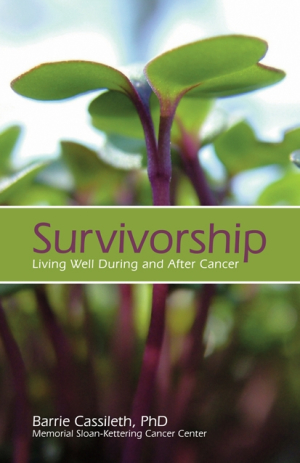Survivorship
Living Well During and After Cancer
Cassileth outlines several complementary cancer therapies in this encouraging, well-organized guide.
No life, it seems, is untouched by cancer. Instead of tapping into the collective fear and dread surrounding illness, Survivorship: Living Well During and After Cancer, by Barrie Cassileth, takes a life-affirming approach.
The book explores complementary therapies, such as acupuncture, massage, and dietary supplements, that improve life for cancer patients. Cassileth does not recommend these to replace conventional treatments like chemotherapy; instead, she recommends therapies that work alongside them: “Where conventional therapies such as chemotherapy and radiation treat the tumor, adjunctive complementary (integrative) therapies treat physical and emotional symptoms.”
Cassileth begins with general explorations of each type of therapy, followed by symptom-based recommendations. The book gives the basics of each so that cancer patients and their families know what options are available, and then makes that information applicable by answering day-to-day questions that plague cancer patients and reduce quality of life, such as, “What can I do if I’m having trouble sleeping?”
Survivorship doesn’t dodge the fearful realities of cancer: anxiety, helplessness, and even death. “It’s entirely normal to feel overwhelmed, anxious, or even angry,” the book states. Giving readers permission to feel the whole spectrum of the cancer experience couples well with the practical advice provided. This book destroys the feeling of powerlessness that often comes with cancer by offering sound advice and actionable strategies for improvement.
Many families affected by cancer don’t know much about the integrative medical approach Cassileth describes, so she moves from basic to complex, explaining concepts thoroughly so that even those unfamiliar with the ins and outs of acupuncture can follow along. But she doesn’t dillydally; people dealing with cancer have enough to cope with, so the pace and length of the book helps readers get to answers quickly.
The writing is clear, concise, and well documented—both medically credible and digestible for everyday people. The tone marries a pragmatic, medical slant with a warm, therapeutic approach. In the confusion of diagnosis and treatment, this tone, and its assurance that someone knowledgeable wants to help, is a gift to readers.
The cover image is striking, conveying a feeling of lively, organic growth. The title and subtitle make the general topic and tone of the book clear, but they don’t mention complementary therapy, which is the heart of the book. Each chapter includes brief sidebars with quotes from real-life cancer survivors, providing more voices of hope and help. The appendices list treatments that aren’t effective, or are even harmful, which are often billed as alternatives rather than complements to traditional treatment; this knowledge could be even more vital than the book’s recommendations because it could save patients from pain, frustration, serious illness, and even death. There’s also a list of helpful resources and organizations, as well as a glossary.
Cassileth’s thorough, empowering approach showcases her expertise (she’s founder of the Integrative Medicine Service at Memorial Sloan-Kettering Cancer Center), but more than that, it shows her compassion for those who are suffering or recovering from cancer.
Reviewed by
Melissa Wuske
Disclosure: This article is not an endorsement, but a review. The publisher of this book provided free copies of the book and paid a small fee to have their book reviewed by a professional reviewer. Foreword Reviews and Clarion Reviews make no guarantee that the publisher will receive a positive review. Foreword Magazine, Inc. is disclosing this in accordance with the Federal Trade Commission’s 16 CFR, Part 255.

